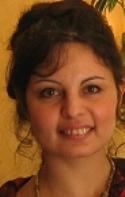
Biography:
Nationality: Belgian (Palestinian)
Diploma in Medical Science (1996). Damascus University, Syria
Training in Damascus hospital (1996-1997), Syria
Master of Medical Sciences-Pathology (1999), Division Pathology, Univ Hosp, KULeuven University, Belgium
September 1999 pre-doctorate research at the Lab. Exp Radiobiology, Division Radiotherapy/Oncology, Univ Hosp, KULeuven University, Belgium
Doctorate in Medical Science (2006), Lab. Exp Radiobiology and Oncology, KULeuven University, Belgium.
Post doc. Position in Harvard University, Lab. of Prof. Judah Folkman, Vascular Biology Program, U.S.A.
Research Fellow in the pathology department, Liege University, Belgium
Experience:
In vivo work (mice, rats) such as: transplantation of tumors, angiographic screening, radiation treatment, measurement of oxygene and blood flow and growth delay in tumours (Oxylite), histological analysis, and in vitro work such as: cell culture, angiogenesis assays, polysome assay, RNA isolation, RT-PCR, FACS analysis, SDS-Page (Electrophoresis), western blot, immunohistochemical staining, Elisa, DNA purification, transfection
Awards:
Award (oral presentation) at the Belgian Association for Cancer Research (BACR) annual meeting, Brussels, 01/2002.
ERR-2001 travel Award based on the quality of the scientific work presented in 31st Annual Meeting of the European Society for Radiation Biology, 09/2001, Dresden, Germany.
Belgian American Educational Foundation Honorary Award (2006).
Abstract:
The Evolution of Angiogenesis and Its Clinical Relevance for Cancer Research
Objective: In medical sciences, clinical relevance is seldom explored from an evolutionary perspective. At this point in time, it is absolutely imperative to expose and apply evolutionary relevance because this addresses not only the question who is biological man, but man in the context from which modern human beings evolved.
Methods: In this paper the Darwinian axiom evolution is not a nice neat progressive march with a predictable destination it is a process of surviving unpredictable events in often unpredictable ways will be applied to the evolution of angiogenesis in the context of cancer research.
Discussion/Results: The salient points which culminate in an angiogenesis evolutionary understanding are (1) the evolution of anaerobic and aerobic energy production with the complex and poignant enzyme lactate dehydrogenase (LDH) designating either the anaerobic or aerobic pathway; LDH pays an unpredictable key role, especially an angiogenic red blood cell (RBC) boost, even for mans brain development; (2) the evolution of hemoglobin and its hormone regulation by erythropoietin; a small genetic change in hemoglobin in hominid evolution contributed to another unpredictable RBC boost, and again toward brain development; (3) the evolution of the placenta as an angiogenic organ for survival of mother and offspring, from an unpredictable survival of mother and/or offsprings to the unpredictable deeply embedded/invaded hemochorial placental relationship for survival of both mother and offspring. All these points are insights into the unprecedented event of cancer.
Conclusion: The evolution of angiogenesis is an unpredictable approach to cancer research bringing clinically relevant answers for survival.